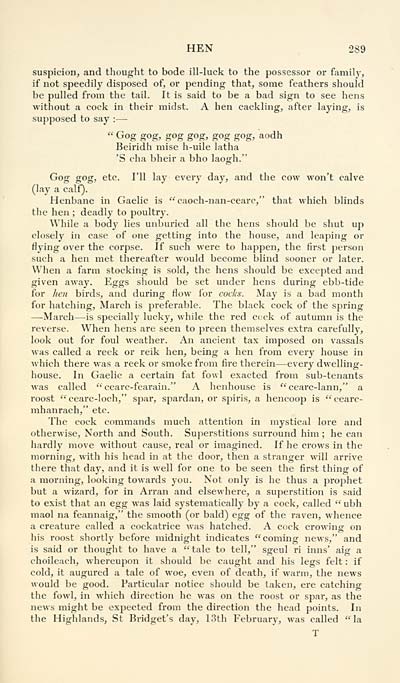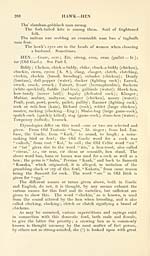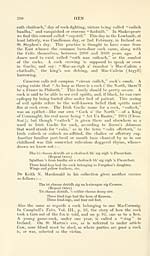Download files
Complete book:
Individual page:
Thumbnail gallery: Grid view | List view

HEN 289
suspicion, and thought to bode ill-luck to the possessor or famil}-,
if not speedily disposed of, or pending that, some feathers should
be pulled from the tail. It is said to be a bad sign to see hens
without a cock in their midst. A hen cackling, after laying, is
supposed to say : —
" Gog gog, gog gog, gog gog, aodh
Beiridh mise h-uile latha
'S cha bheir a bho laogh."
Gog gog, etc. I'll lay every day, and the cow won't calve
(lay a calf).
Henbane in Gaelic is " caoch-nan-cearc," that which blinds
the hen ; deadly to poultry.
While a body lies unburied all the hens should be shut up
closely in case of one getting into the house, and leaping or
flying over the corpse. If such were to happen, the first person
such a hen met thereafter would become bhnd sooner or later.
When a farm stocking is sold, the hens should be excepted and
given away. Eggs should be set under hens during ebb-tide
for hen birds, and during flow for cocks. May is a bad month
for hatching, March is preferable. The black cock of the spring
— -March — is specially lucky, while the red ci ck of autumn is the
reverse. When hens are seen to preen themselves extra carefully,
look out for foul weather. An ancient tax imposed on vassals
was called a reek or reik hen, being a hen from every house in
which there was a reek or smoke from fire therein — every dwelling-
house. In Gaelic a certain fat fowl exacted from sub-tenants
was called " cearc-fearain." A henhouse is " cearc-lann," a
roost " cearc-loch," spar, spardan, or spiris, a hencoop is " cearc-
mhanrach," etc.
The cock commands much attention in mystical lore and
otherwise, North and South. Superstitions surround him ; he can
hardly move without cause, real or imagined. If he crows in the
morning, with his head in at the door, then a stranger will arrive
thei'e that day, and it is well for one to be seen the first thing of
a morning, looking towards you. Not only is he thus a prophet
but a wizard, for in Arran and elsewhere, a superstition is said
to exist that an &gg was laid systematically by a cock, called " ubh
maol na feannaig," the smooth (or bald) egg of the raven, whence
a creature called a cockatrice was hatched. A cock crowing on
his roost shortly before midnight indicates "coming news," and
is said or thought to have a "tale to tell," sgeul ri inns' aig a
choileach, whereupon it should be caught and his legs felt : if
cold, it augured a tale of woe, even of death, if warm, the news
would be good. Particular notice should be taken, ere catching
the fowl, in which direction he was on the roost or spar, as the
news might be expected from the direction the head points. In
the Highlands, St Bridget's day, 13th February, was called "la
T
suspicion, and thought to bode ill-luck to the possessor or famil}-,
if not speedily disposed of, or pending that, some feathers should
be pulled from the tail. It is said to be a bad sign to see hens
without a cock in their midst. A hen cackling, after laying, is
supposed to say : —
" Gog gog, gog gog, gog gog, aodh
Beiridh mise h-uile latha
'S cha bheir a bho laogh."
Gog gog, etc. I'll lay every day, and the cow won't calve
(lay a calf).
Henbane in Gaelic is " caoch-nan-cearc," that which blinds
the hen ; deadly to poultry.
While a body lies unburied all the hens should be shut up
closely in case of one getting into the house, and leaping or
flying over the corpse. If such were to happen, the first person
such a hen met thereafter would become bhnd sooner or later.
When a farm stocking is sold, the hens should be excepted and
given away. Eggs should be set under hens during ebb-tide
for hen birds, and during flow for cocks. May is a bad month
for hatching, March is preferable. The black cock of the spring
— -March — is specially lucky, while the red ci ck of autumn is the
reverse. When hens are seen to preen themselves extra carefully,
look out for foul weather. An ancient tax imposed on vassals
was called a reek or reik hen, being a hen from every house in
which there was a reek or smoke from fire therein — every dwelling-
house. In Gaelic a certain fat fowl exacted from sub-tenants
was called " cearc-fearain." A henhouse is " cearc-lann," a
roost " cearc-loch," spar, spardan, or spiris, a hencoop is " cearc-
mhanrach," etc.
The cock commands much attention in mystical lore and
otherwise, North and South. Superstitions surround him ; he can
hardly move without cause, real or imagined. If he crows in the
morning, with his head in at the door, then a stranger will arrive
thei'e that day, and it is well for one to be seen the first thing of
a morning, looking towards you. Not only is he thus a prophet
but a wizard, for in Arran and elsewhere, a superstition is said
to exist that an &gg was laid systematically by a cock, called " ubh
maol na feannaig," the smooth (or bald) egg of the raven, whence
a creature called a cockatrice was hatched. A cock crowing on
his roost shortly before midnight indicates "coming news," and
is said or thought to have a "tale to tell," sgeul ri inns' aig a
choileach, whereupon it should be caught and his legs felt : if
cold, it augured a tale of woe, even of death, if warm, the news
would be good. Particular notice should be taken, ere catching
the fowl, in which direction he was on the roost or spar, as the
news might be expected from the direction the head points. In
the Highlands, St Bridget's day, 13th February, was called "la
T
Set display mode to: Large image | Transcription
Images and transcriptions on this page, including medium image downloads, may be used under the Creative Commons Attribution 4.0 International Licence unless otherwise stated. ![]()
| Early Gaelic Book Collections > Blair Collection > Gaelic names of beasts (mammalia), birds, fishes, insects, reptiles, etc > (315) |
|---|
| Permanent URL | https://digital.nls.uk/79333027 |
|---|
| Description | A selection of books from a collection of more than 500 titles, mostly on religious and literary topics. Also includes some material dealing with other Celtic languages and societies. Collection created towards the end of the 19th century by Lady Evelyn Stewart Murray. |
|---|
| Description | Selected items from five 'Special and Named Printed Collections'. Includes books in Gaelic and other Celtic languages, works about the Gaels, their languages, literature, culture and history. |
|---|

